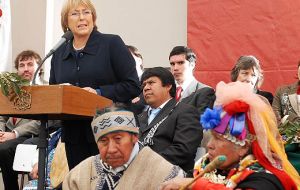MercoPress. South Atlantic News Agency
Bachelet promised to submit a proposal to Congress which seeks to create a ministry for Indigenous people.
 • Chilean President Michelle Bachelet apologizes for “errors and horrors” committed against the Mapuche
• Chilean President Michelle Bachelet apologizes for “errors and horrors” committed against the Mapuche On Friday, Chilean President Michelle Bachelet extended a formal apology to the Mapuche people for “errors and horrors” perpetrated by the state against their communities. She announced plans to concede more power and resources to the Indigenous group.
Speaking from La Moneda presidential palace in the capital city of Santiago, Bachelet conceded that “we've failed as a country.”
“I want, solemnly and with humility, to ask forgiveness from the Mapuche people for the errors and horrors committed or tolerated by the state in our relation with them and their communities,” she added.
Reuters reported that amid rising tension between the Mapuche and loggers and farmers in the south-central provinces of the country, Bachelet promised to submit a project to Congress which would create a ministry for Indigenous people.
She also announced that resources would be allocated to build roads and to provide safe drinking water in remote regions where Mapuche communities are located. The program would also implement a plan of ancestral land transferal back to the Indigenous group.
An Indigenous group located on both sides of the Andes in southern Chile and western Argentina, the Mapuche successfully fought resistance wars against Spanish invaders ever since their arrival in the 1500s. Writing for CounterPunch, John Severino noted that “unlike their hierarchical neighbors, the Inca, the Mapuche organized horizontally, and their capacity for self-defense was so renowned that Wallmapu (Mapuche's historical territory) became known to Europeans as 'The Spanish Graveyard.'”
Spanish colonizers in Chile and Spain weren't able to conquer Wallmapu until the 1880s. Since then, through waves of invasion and dispossession, the Mapuche have struggled tirelessly to preserve their language, culture, religion, food and medicinal knowledge.
The Chilean state and privately-owned companies have historically robbed the Mapuche of their ancestral land, natural resources, and, in the process, committed heinous crimes against the them. The result of centuries of colonization has caused the Mapuche community to be among the poorest people in Chile.
Over the past few years, according to Reuters, increased acts of arson against logging companies and other firms rooted in resource extraction have been attributed to the Mapuche.




Top Comments
Disclaimer & comment rules-

-

-

Read all commentsBallenet should apologise for the abysmal nature of her present corrupt socialist government, reflected in her approval rating in the polls at just 18 percent.
Jun 25th, 2017 - 01:23 pm +1You have it both wrong and backwards, piba, as is so much of your argentinicity. The “araucano” word was given by the Spanish and is thus comparatively inappropriate for reference to the Mapuche. The word arauco means “silty water.” “Mapuche” is a term that the Mapuche used to describe themselves long before the arrival of the Spanish, though it was also used in Quechua to describe the Mapuche. Véase: “En la lengua mapuche o mapudungún, el nombre que ellos mismos se dan es mapuche, o mapunche, compuesto de mapu, 'tierra, país', y che, 'persona, gente'; es decir, 'gente de la tierra', «nativo». ” ¿viste?
Jun 25th, 2017 - 05:36 pm +1Argentine racism and xenophobia have attempted to deny that the Mapuche are native to what is now Argentina. However, prior to the arrival of the Spanish, the Mapuche had no reason to consider the present political divisions as any sort of boundary, and moved freely between Chile and Argentina, with permanent or semi-permanent settlements on both sides of the present frontiers. Argentine politicians and legal wannabes attempt to dismiss the indigenous Mapuche as foreigners in order to reject ancient, ancestral claims to the territory in which archeologists have confirmed their long pre-colonial presence, with perhaps as much as 2000 years in present-day Argentina before the arrival of the Spanish.
“Just Mary” will now attempt to convince us that there was no genocide by the argies against the Mapuche and other indigenous peoples.
An appalling lack of scholarship, Mary, though we see that your misstatements coincide perfectly with Argentine propaganda. You offer further evidence that argentinicity is not bounded by ADN or frontiers but thrives where intellectual dishonesty is encouraged for the glorification of the State. Your limitations keep you from even understanding the errors associated with the “Araucanian” naming and reveal your participation in the racial discrimination toward indigenous peoples that characterise the modern Argentine kultur.
Jun 25th, 2017 - 10:07 pm +1Restricting your notions to the limited European observations of the early colonial era concerning early Mapuche settlement and ignoring the subsequent discoveries by contemporary archeologists speak again to your lack of intellectual honesty. You would do well to review the archaeological record of Mapuche habitation in what is now Argentina, long before the discovery of the New World.
Commenting for this story is now closed.
If you have a Facebook account, become a fan and comment on our Facebook Page!